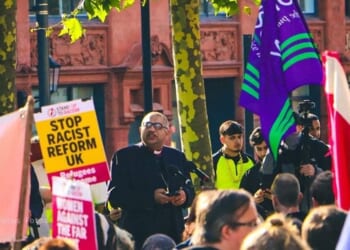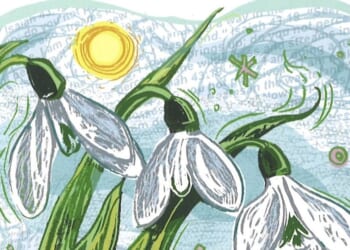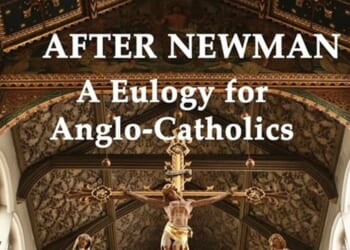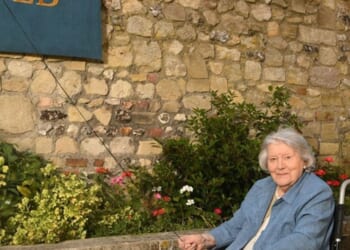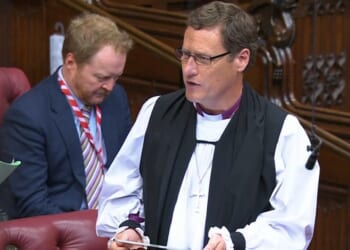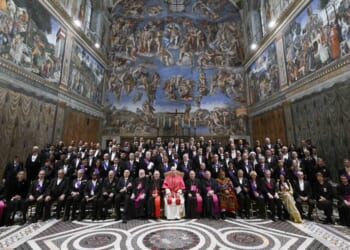“WHAT’S in a flag?” Juliet didn’t quite say. It is a question of real significance right now, as the country, or bits of it, wraps itself in Union flags, Saltires, and, in particular, St George’s Crosses (Analysis, 26 September). What does all these flags mean? Whom, indeed, does any flag mean?
Juliet’s famous answer — “that which we call a rose By any other name would smell as sweet” — sounds like common sense. The perfume given off by a rose does not alter according to the arbitrary name with which we label a plant. Rose smell is simply a rose smell, right?
Alas, reality is subtler. The words that we use of things inform our experience of those things. Roses may give off an odour, but it is human beings who smell it, and humans are complex, symbolic, meaning-saturated mammals, whose encounter with reality is framed and shaped by their understanding and description of it. Words contort and colour the world that they encounter; or, as Bart and Homer Simpson, put it more pithily, in response to Lisa’s quoting Juliet’s line about that rose that by any other name smells as sweet: “Not if you called them stench-blossoms . . . or crap-weeds.”
As with roses, so (even more) with flags. Yes, there are things that are objectively there about flags — patterns and histories, for example: what they look like and where they have been used.
But, in essence, what a flag means depends on how it is deployed. The Stars and Stripes signified different things to the soldiers who planted it on newly liberated battlefields and to the Black Panthers who burnt it in protest against racism. The hammer and sickle meant different things to urban workers at the end of the 19th century and to middle-class professionals in the 20th. The Nazi appropriation of the swastika, once a symbol of prosperity and good luck, altered its meaning beyond recognition and, perhaps, beyond redemption. Flags absorb meaning from the people who do things with them.
SO IT is with the humble St George’s Cross. Fluttering from a car window or outside a house during a World Cup, the George’s Cross is a statement about football and loyalty. Daubed on the walls of a mosque or an Islamic Centre, as it was in my home town a few weeks ago, it means something very different.
This is why it is so difficult to say anything definitive about the explosion in these flags during the past month or so. They could be examples of patriotism, nationalism, xenophobia, Islamophobia, or outright racism. They might be making a positive statement about tradition and solidarity, or a negative one of exclusion and alienation. In all probability, they will mean all of the above and more.
The greatest danger comes when something as national and, therefore, in theory, as inclusive as the St George’s Cross comes to be owned by a narrow section of the population: when a particular group “captures the flag”, so to speak. It is almost always a two-way street, as much to do with other groups’ relinquishing ownership as with one particular group’s making a flag-grab.
This has been the case in England (and to a slightly lesser extent Britain) during the past 50 years. The Left was once intensely patriotic, but, in the last quarter of the 20th century, that patriotism was eclipsed, particularly among the elite Left, by a commitment to the kind of internationalism and universalism that viewed national loyalties as inherently suspect.
There were exceptions. George Orwell, self-consciously left-wing and self-consciously patriotic, cast a long shadow across the century, and some prominent figures on the contemporary Left, such as Billy Bragg and Caroline Lucas, have promoted a kind of progressive patriotism. But their voices have been drowned out by a louder left-wing chorus, whose commitment lay more with international courts, bodies, and human rights than it did with movements and institutions that were “merely” national. The flag was abandoned, metaphorically and literally.
IT TURNED out to be a mistake. Flags are semiotically rich: they are loaded weapons, and leaving them lying around unused is never a great idea. Legitimised and encouraged by widespread, sometimes officially mandated, deployment of other identity-signalling flags — Saltire, Pride, trans — some elements of the English Right have picked up and used the St George’s Cross to signal their own exclusive and resentful identity. Hatred of Muslims, migrants, and foreigners is poured into a flag that risks coming to stand for something that most British people do not agree with.
But I want to emphasise the some here, because I do not think (and refuse to believe) that everyone who hangs a St George’s flag from a lamp-post or goes on a march to hear Tommy Robinson and Elon Musk speak is motivated by exclusion and resentment. On the contrary, it seems to me that, despite some over-enthusiastic reporting to the contrary, not only was the Unite the Kingdom rally — at more than 100,000 people — larger than expected, but it was also far more peaceful than expected, generating a mere 25 or so arrests.
To dismiss all flag-wrapped campaigners simply as bigots is not only to relinquish any hope of recapturing the flag, but to impute ugly and seemingly unjustified motives to many of our fellow citizens. It is, at best, tactically not smart, and often a symptom of an elite hauteur that is no more appealing than thoughtless populism.
Christians should get this point about the malleability of flags. After all, perhaps the greatest repurposing of a symbol in human history, even more effective than the Nazi’s hijacking of the swastika, was the early Christian redefinition of the cross from being an instrument of imperial power, domination, and torture to a symbol of unconditional love, sacrifice, life, and hope.
Flags, including those with crosses, do not mean only one thing. They do not signify a single, objective given set of values and commitments. They are porous, protean, permeable, absorbing the words and behaviour of the individuals and communities that wave, hang, and wrap them.
So, I would like to see the St George flag everywhere, not only on street lamps and football stadiums, but hung in prisons, drug rehab units, courts of law, schools, and asylum processing centres: in places where people are healed, justice is done, children are formed, and strangers are welcomed in.
Nick Spencer is Senior Fellow at Theos.












